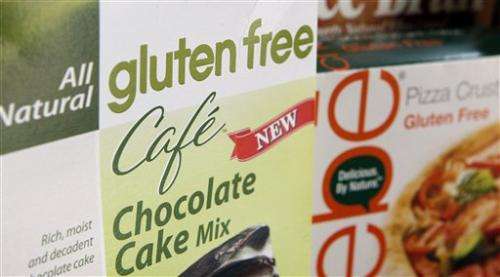In this Aug. 2, 2013, file photo, a variety of foods labeled Gluten Free are displayed in Frederick, Md., Friday, Aug. 2, 2013. Starting this week, "gluten free" labels on packaged foods have real meaning. Until now, the term "gluten free" had not been regulated, and manufacturers made their own decisions about what it means. (AP Photo/Jon Elswick, File)
Starting this week, "gluten-free" labels on packaged foods have real meaning. Until now, the term "gluten-free" had not been regulated, and manufacturers made their own decisions about what it means.
This new requirement is especially important for people who suffer from celiac (SEE-lee-ack) disease and don't absorb nutrients well. They can get sick from the gluten found in wheat and other cereal grains.
Food manufacturers faced a Tuesday deadline to ensure that anything labeled gluten-free contains less than 20 parts per million of gluten—ensuring that those products are technically free of wheat, rye and barley. That amount is generally recognized by the medical community to be low enough so that most people who have celiac disease won't get sick if they eat it.
© 2014 The Associated Press. All rights reserved.






















